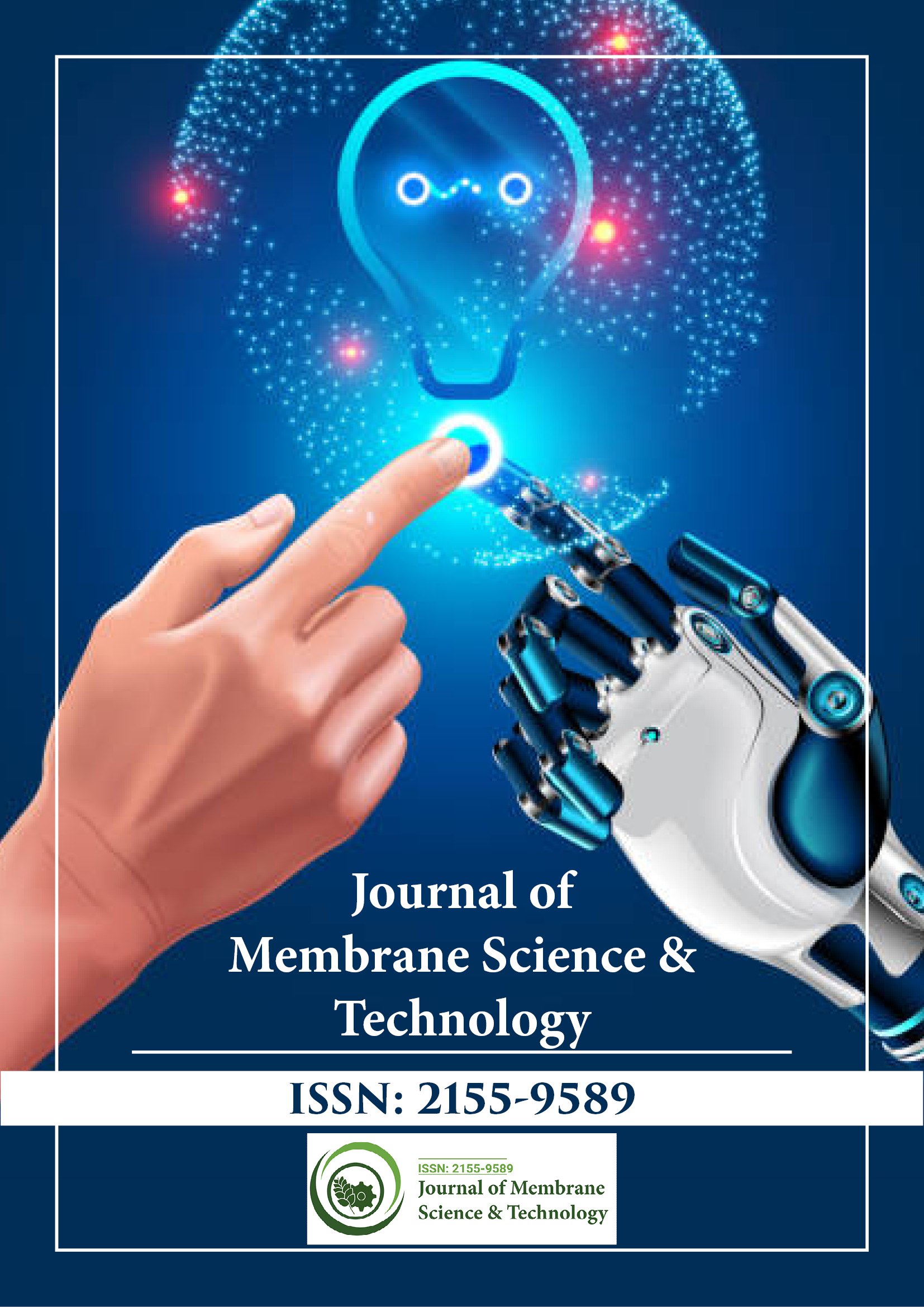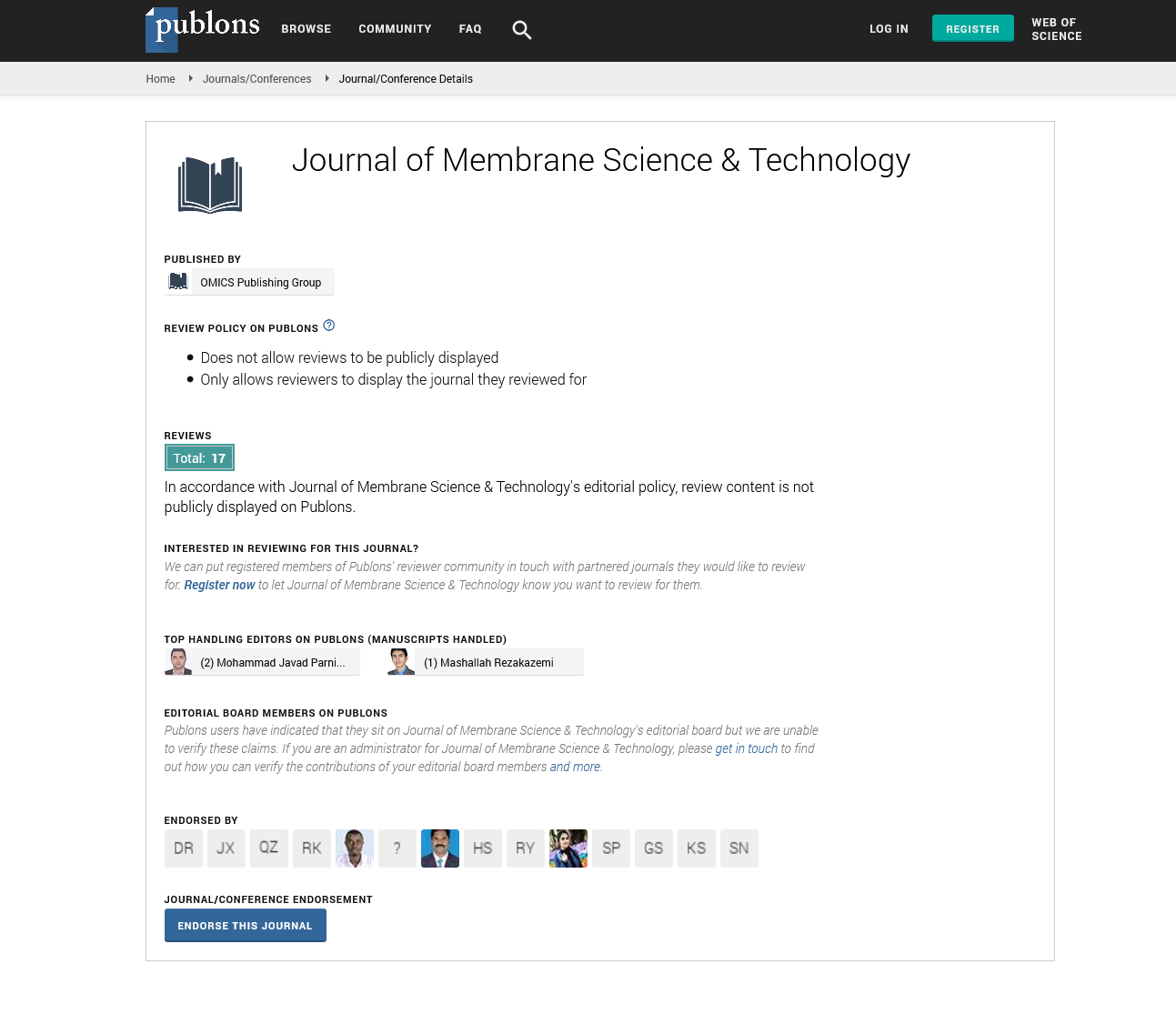Indexed In
- Open J Gate
- Genamics JournalSeek
- Ulrich's Periodicals Directory
- RefSeek
- Directory of Research Journal Indexing (DRJI)
- Hamdard University
- EBSCO A-Z
- OCLC- WorldCat
- Proquest Summons
- Scholarsteer
- Publons
- Geneva Foundation for Medical Education and Research
- Euro Pub
- Google Scholar
Useful Links
Share This Page
Journal Flyer

Open Access Journals
- Agri and Aquaculture
- Biochemistry
- Bioinformatics & Systems Biology
- Business & Management
- Chemistry
- Clinical Sciences
- Engineering
- Food & Nutrition
- General Science
- Genetics & Molecular Biology
- Immunology & Microbiology
- Medical Sciences
- Neuroscience & Psychology
- Nursing & Health Care
- Pharmaceutical Sciences
Commentary - (2023) Volume 13, Issue 6
Membrane Renaissance: Redefining Water Treatment and Desalination
Chiarelli Fizzi*Received: 23-Oct-2023, Manuscript No. JMST-23-23516; Editor assigned: 26-Oct-2023, Pre QC No. JMST-23-23516 (PQ); Reviewed: 09-Nov-2023, QC No. JMST-23-23516; Revised: 16-Nov-2023, Manuscript No. JMST-23-23516 (R); Published: 23-Nov-2023, DOI: 10.35248/2155-9589.23.13.365
Introduction
Access to clean and safe drinking water is a fundamental human right and a pressing global challenge. With the ever-increasing demand for freshwater and growing concerns about water quality, innovative technologies are essential to meet these challenges sustainably. Membrane-based processes have emerged as powerful tools in the fields of water treatment and desalination, offering efficient and environmentally friendly solutions.
Membrane-Based Processes in Water Treatment
Nanofiltration (NF)
Nanofiltration is a membrane process that targets the removal of divalent ions, organic matter, and hardness from water. It occupies a crucial position between UF and reverse osmosis in terms of selectivity. Advanced NF membranes with enhanced rejection capabilities and reduced fouling tendencies are instrumental in achieving high-quality water treatment.
Reverse Osmosis (RO)
Reverse osmosis is a well-established and widely adopted technology for desalination and the removal of dissolved ions, organic contaminants, and pathogens from water. Recent advances in RO membranes focus on improving salt rejection rates, energy efficiency, and fouling resistance. Thin-film composite membranes and forward osmosis-driven processes represent significant developments in this area.
Forward Osmosis (FO)
Forward osmosis has gained prominence as an energy-efficient desalination technology. FO relies on the osmotic potential difference between a feed solution (seawater or brackish water) and a draw solution (a more concentrated solution). Membranes personalied for FO processes play a critical role in enhancing freshwater recovery and reducing energy consumption.
Pressure-Retarded Osmosis (PRO)
Pressure-retarded osmosis is an emerging desalination technique that utilizes the osmotic potential difference to generate energy while desalting water. Membranes capable of maintaining a controlled flow of water molecules while blocking ions are pivotal in the success of PRO processes. Recent developments in PRO membrane technology aim to improve efficiency and reduce fouling.
Innovative Membrane Materials and Designs
Bioinspired membranes
Bioinspired membranes take inspiration from natural systems, such as cell membranes and aquaporins. These membranes mimic biological structures to enhance water permeability, selectivity, and anti-fouling properties. Innovations in bioinspired membrane design offer sustainable solutions for clean water production.
While membrane-based processes have made remarkable strides in water treatment and desalination, several challenges remain. These include reducing energy consumption, addressing fouling and scaling issues, and increasing the sustainability of membrane fabrication processes. The integration of Artificial Intelligence (AI) and Machine Learning (ML) into membrane system control and optimization shows promise in overcoming these challenges. As we look ahead, the convergence of nanotechnology, advanced materials, and data-driven strategies holds the potential to redefine the landscape of membrane-based processes. Personalized membranes with improved selectivity, durability, and environmental compatibility are expected to play a pivotal role in ensuring equitable access to freshwater resources worldwide.
Conclusion
Membrane-based processes have become indispensable in the quest for clean and sustainable water resources. Their versatility, efficiency, and adaptability make them central to addressing pressing global water challenges. As technology continues to advance, membrane-based processes will likely play an increasingly vital role in securing access to clean and safe drinking water for all, as well as in meeting the growing demand for desalinated water in a rapidly changing world.
Citation: Fizzi C (2023) Membrane Renaissance: Redefining Water Treatment and Desalination. J Membr Sci Technol. 13:365.
Copyright: © 2023 Fizzi C. This is an open-access article distributed under the terms of the Creative Commons Attribution License, which permits unrestricted use, distribution, and reproduction in any medium, provided the original author and source are credited.

